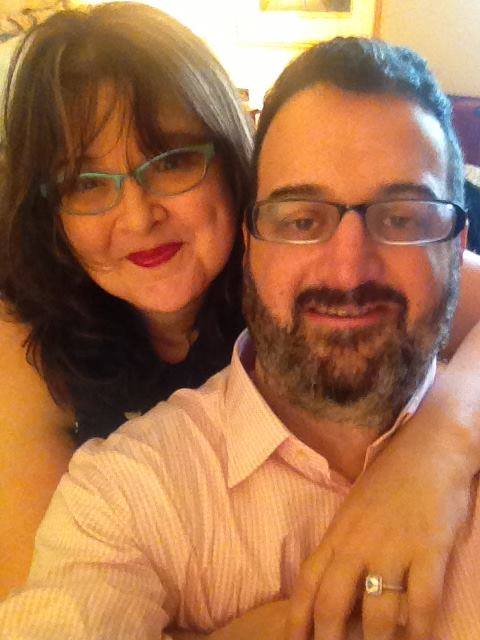By Anna March
My husband, Adam, paraplegic, is waiting for a search of his wheelchair, and I am cleared but lingering for him. We are at the TSA checkpoint in the airport in Honolulu. The trade winds blow warm and humble. The sea sky and bowing palm trees frame us in the open air terminal. I am staring at a purse the color of a ballet slipper in the window of a store just beyond the stark security inspection lanes. Its Siren’s call: to feed my pocketbook-buying habit. I notice a federal guard with rigid posture frowning, staring at me. I point toward Adam, tell her, “I’m waiting for my husband,” and she says in a tone as crisp as the knife pleats in her blouse, “I know. I’m going to pass you his belongings.” I snarl, “I don’t carry his bags.” She puts her hand on her hip, bellows “EXCUSE ME?” “You heard me,” I snap.
Adam, calm as ever, smiles, put his hand on the small of my back, “Why don’t you go to the store? Leave your bag here, I’ll bring it.” I lean my heavy carry-on on the wall in front of him, glaring at the guard, taking only my phone and credit card with me. I was cracking with anger, disgusted by the agent treating me like Adam’s servant and choosing to talk to me about his things rather than directly to him. This happens many times a week, people ignoring Adam and instead speaking to me about him, but only today am I enraged over it. Why is this particular exchange scratching me so harshly? I know it has something to do with the perception that I should carry my husband’s bags but why does that rankle me this much?
I huff into a coffee shop wafting fresh brewed Kona to mull. I know that what’s bothering me is somehow mixed up with gender. Questions I’ve spent my life asking are suddenly swirling. What does gender even mean? What is perceived as womanly, manly and why? Why are we all so screwed up about gender roles to the point that we still want to squeeze everyone into a narrow binary? What do power and ability really mean?
As a woman, my whole life I have been treated as less physically capable than men. The world’s default mode when I’m with an able-bodied man has always been that he is going to be the athlete, the one to lead, drive, carry the heavy things, and that if anyone needs assistance it will be me, the woman. In the world’s hierarchy man trumps woman but woman trumps disabled. Everything about the existence of these pecking orders repels me. Yet somehow I know that I am rankled today at least in part because I want everyone to see Adam as strong, capable, like I do. But why?
Am I furious because I think my own femininity is diminished if others don’t perceive Adam as competent and strong? I want to be seen as feminine even when rejecting such notions. Notice the delicate orchidaceous pattern on my sundress, my pretty nails painted a soft saltwater taffy color, my delicate shimmery lipstick turning my lips into Bazooka bubblegum. Notice my strong man, what too many in our hobbled world consider the ultimate accessory to femininity.
I am thinking, “I have girly insides,” even while literally shaking my head at my own absurdity. I rebel whenever almost anything is labeled in a gendered way, revolt against making strength masculine territory, believe dresses are for those who want them, not merely cis-women, and think gender is a fluid social construct. I’ve been actively fighting for intersectional, feminist justice – including freedom from the hard irons of gender binaries – since childhood. And yet here I am, wanting the world to see my husband’s physical strength and what I deem my pinkest parts. I want everyone to know that he rock climbs, walks our big, galloping dog and is the one to get up and investigate things that go bump at 4 a.m. “You should really be ashamed at yourself,” I tell myself, stepping out of the coffee shop to find Adam. I should be chagrined, and am, but it is what I am thinking, nonetheless.
And then I see Adam, my kind, broken, sweet, strong husband, with our flotsam piled high on his lap. And balanced on top, reaching up over his head, like a pastel maraschino on top of a loaded sundae, the tiny pink handbag from the boutique. He is peeking around the mound of luggage so he can see where he is going and he sees me as I am walking toward him. “Your bags, ma’am” he says and we both laugh. Maybe the only thing that matters is how much love and respect any two people can hold when they look at each other? I take his carryall into one hand and my hefty overnighter in the other; the pink purse still stands proudly on his lap as we head to our gate. We are going to fling ourselves in the air, hold hands, grapple with the big questions as we cross the magnitude of the pacific aloft in the night sky, hoping to land, together.
Anna March’s writing has appeared in The New York Times’ Modern Love column, frequently in Salon and The Rumpus and in New York Magazine, Tin House, Hip Mama, and many other publications. Her memoir is forthcoming. Follow her on Twitter @annamarch or learn more about her at annamarch.com.
She will be leading a workshop, “WRITING PAST SHAME: WRITING THE TOUGH STUFF WITHOUT (TOO MUCH) FEAR with Wendy Ortiz and Antonia Crane December 4- 6, 2015 in Ojai, CA. For more information, contact her at an**@*******ch.com.



Beautiful essay, Anna.